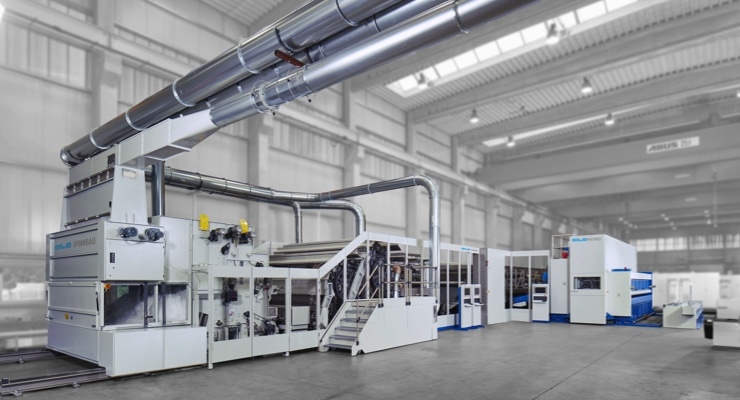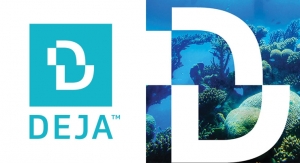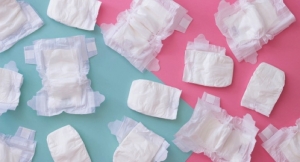06.18.19
At ITMA 2019, DiloGroup (hall 5, booth B201) will once again exhibit a complete operating production line on a booth space of ca. 1.100 m2. This line will illustrate improvements and modifications as well as innovations in numerous machine design-engineering aspects. The complete technological process starting with fiber preparation via card feeding, to precise web forming and the new Hyperpunch Hα needling will be shown. Elements of “industry 4.0” have been incorporated to design the assisting operating system “diloline 4.0.”
In the fiber preparation phase with DiloTemafa components, the “Baltromix Pro” will show a faster blend changeover which is a prerequisite for even higher throughput. An exact control of the filling level avoids idling or over-filling by feeding fiber bales with the aid of a “bale timer.” The sensor module “DI-LoWatt” assures fiber transport with a minimum of air and thus saves energy.
The current universal card feeder VRS-P Vibration Chute is supplemented by a fine opening stage to further improve feeding quality. After the “VectorQuadroCard” the latest version of its high speed crosslapper “HyperLayer” will be included which allows highest throughput at small to medium layering widths and which is especially suited for hydroentanglement lines.
The advantages of the elliptical needle beam kinematics of Hyperpunch technology is even better used in the “Hyperpunch Hα” loom as a very economic version of the classical Hyperpunch technique. The needleloom on show – DI-LOOM OD-II SLHαV – is equipped with the new needle pattern 6000X to give a very homogeneous stitching distribution.
An automatic starting-aid “smart-start” for the card with automatic threading to crosslapper and needleloom reduces the number of manual interventions.
In the field of “textile additive manufacturing” the “3D-Lofter” will offer further chances of fiber savings for needlefelts used in the automotive and other applications because topologically distributed fiber masses can be positioned in the felt where needed by so called “individual webforming spots.”
“diloline 4.0” includes a wide variety of “smart manufacturing” actions in collaboration with Siemens which all aim at further simplifying operation, increasing transparency in web forming and consolidation thereby increasing efficiency. Production data are stored, documented and compared. An “alarm monitor” indicates disturbances. A production analysis documents the reasons for standstill times. This data can be used to avoid disturbances. Numerous information modules can be recalled via mobile apps and cloud data (mindSpheres). All these methods to control the machines and to generate production data will be helpful to further secure the complex functions within the production system independently of personnel and shift.
In the fiber preparation phase with DiloTemafa components, the “Baltromix Pro” will show a faster blend changeover which is a prerequisite for even higher throughput. An exact control of the filling level avoids idling or over-filling by feeding fiber bales with the aid of a “bale timer.” The sensor module “DI-LoWatt” assures fiber transport with a minimum of air and thus saves energy.
The current universal card feeder VRS-P Vibration Chute is supplemented by a fine opening stage to further improve feeding quality. After the “VectorQuadroCard” the latest version of its high speed crosslapper “HyperLayer” will be included which allows highest throughput at small to medium layering widths and which is especially suited for hydroentanglement lines.
The advantages of the elliptical needle beam kinematics of Hyperpunch technology is even better used in the “Hyperpunch Hα” loom as a very economic version of the classical Hyperpunch technique. The needleloom on show – DI-LOOM OD-II SLHαV – is equipped with the new needle pattern 6000X to give a very homogeneous stitching distribution.
An automatic starting-aid “smart-start” for the card with automatic threading to crosslapper and needleloom reduces the number of manual interventions.
In the field of “textile additive manufacturing” the “3D-Lofter” will offer further chances of fiber savings for needlefelts used in the automotive and other applications because topologically distributed fiber masses can be positioned in the felt where needed by so called “individual webforming spots.”
“diloline 4.0” includes a wide variety of “smart manufacturing” actions in collaboration with Siemens which all aim at further simplifying operation, increasing transparency in web forming and consolidation thereby increasing efficiency. Production data are stored, documented and compared. An “alarm monitor” indicates disturbances. A production analysis documents the reasons for standstill times. This data can be used to avoid disturbances. Numerous information modules can be recalled via mobile apps and cloud data (mindSpheres). All these methods to control the machines and to generate production data will be helpful to further secure the complex functions within the production system independently of personnel and shift.





